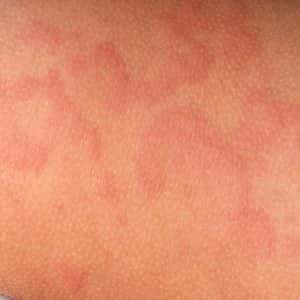
Hives are red itchy bumps on the skin, known in doctor-speak as “urticaria.” They are often caused by an allergic reaction that lasts for a few hours or a couple of days. An antihistamine such as diphenhydramine (Benadryl) can usually ease the discomfort for a short-term problem such as this.
Long-Lasting Hives:
When they last longer than six weeks, they enter the realm of mystery. Patients become frustrated by the never-ending itch that seemingly has no cause and no clear cure.
We recently heard from one reader who had a chronic case. Steroid shots, oral prednisone and antihistamines were barely able to control the condition. The nonstop itching was interfering with sleep, and the steroids were causing horrible heartburn.
Vitamin D3 for Urticaria:
We shared research on vitamin D3 as a treatment for chronic hives (Annals of Allergy, Asthma and Immunology, online Feb. 7, 2014). The researchers had found that 4,000 IU of vitamin D3 daily reduced symptoms significantly.
Readers responded to this person’s dilemma with their own stories. One offered this:
“I also had chronic hives and was on steroids, prednisone and Benadryl. My pharmacist told me to stop taking them and to try Zantac morning and night. It worked amazingly well. My hives have been gone now for several years.”
Some people eventually discovered that their urticaria was a reaction to cholesterol medication. Here is one example:
“I read the article from the person with the horrible itching problem. I, too, had severe itching. It turned out to be due to different cholesterol medications I had been taking.
“The slightest touch to my skin made me itch and break out in hives. I even dreaded taking off my socks! I was switched to Crestor and so far have only had minor problems with itching.”
Is It Something in the Clothing?
Other readers found that changing their laundry habits made a difference. One wrote:
“I had a similar experience with itching. Steroids didn’t help, but I heard that scented dryer cloths could be a problem. I stopped using them and that solved the problem.”
Another reported:
I SUFFERED from hives and received cortisone shots, but nothing helped permanently. Finally, an emergency room doctor in Spain said to wear all cotton clothes and wash them with perfume-free detergent. Following this advice provided instant relief!”
Might Diet Be at the Root of the Itch?
Because urticaria can be a sign of allergy, doctors in Thailand tried having people avoid foods that might be causing the problem. Patients who avoided the foods that caused a reaction with a skin prick test had much less itching (Journal of the Medical Association of Thailand, Dec., 2015). The foods most frequently associated with hives were fish, milk, tomato, shrimp, peanut, oyster and yeast.
Could a Health Problem Cause Urticaria?
Sometimes the source of the problem is a hidden health condition. One reader reported her experience:
“I had a demonic case of itching in 2002 with as many as 100 lesions 24/7 for 10 months. It ruined my life and I traveled all over the East Coast to consult various experts who offered no relief. The only thing I learned is that the rebound from steroids makes hives worse and that is the wrong way to go.
“I went to a medical library to do my own research and found that thyroid suppression could help. My MD increased my Synthroid and the hives disappeared within four days.”
Sometimes hives can be a symptom of something serious. The most distressing story we received was the following:
A close friend of mine had a problem with chronic hives. Finally, one doctor recognized chronic itching as a known symptom of pancreatic cancer and ordered tests that verified it. He said the itching revealed the condition early and allowed prompt surgery that gave my friend five more years of life.
This is a reminder that hives deserve to be taken seriously and treated with respect. Doctors may have a difficult time figuring out the reason for ongoing urticaria. As a result, patients will need to help with the sleuthing.
Revised 6/23/16

